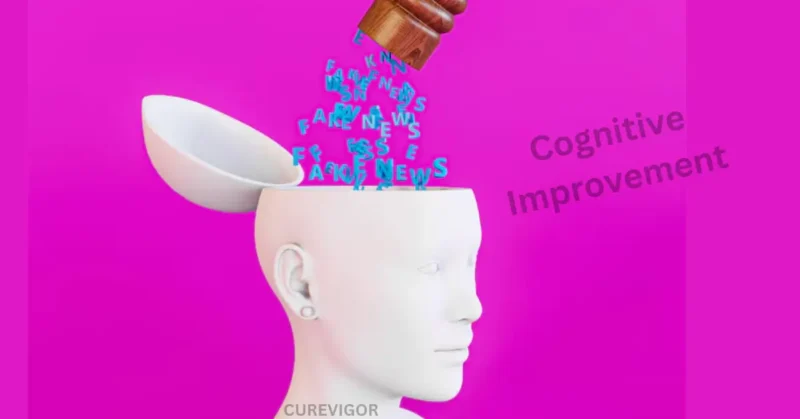Uncover the Practical Strategies for Enhancing Your Cognitive Abilities. Explore practical tips, real-life success stories, and expert advice for boosting cognitive skills. Discover the path to a sharper, brighter you!
Practical Strategies For Enhancing Your Cognitive Abilities
Smartness in Action becomes pivotal in a world constantly demanding innovation and adaptability. Let’s delve into the essence of smartness and explore practical strategies for enhancing cognitive abilities.
Improving cognitive function is essential for personal and professional growth. By focusing on practical strategies, we can significantly boost our mental performance. This article explores scientifically backed methods to enhance cognitive abilities, foster brain health, and maintain peak mental performance across various tasks.
1. Understanding Cognitive Enhancement
Cognitive abilities refer to mental processes that include memory, attention, problem-solving, language comprehension, and reasoning. Enhancing these abilities involves lifestyle changes, mental exercises, and proper nutrition. By integrating specific strategies into daily routines, individuals can experience substantial improvements in both short-term and long-term cognitive functioning.
2. Exercise and Its Role in Cognitive Improvement

Physical Exercise is crucial for brain health. Regular cardiovascular and strength-training exercises have been shown to promote neuroplasticity, the brain’s ability to adapt and grow. Aerobic Exercise, in particular, increases blood flow to the brain, enhancing memory retention and concentration.
- Cardiovascular exercises like running, swimming, and cycling improve hippocampal function, directly impacting memory.
- Strength training promotes the release of neurotrophic factors, which foster brain cell growth.
Type of Exercise Cognitive Benefits
- Aerobic Exercise Improves memory and focus
- Strength Training Enhanced problem-solving skills
- Yoga and Stretching Reduced stress and improved mental clarity
3. Mental Stimulation: Brain Exercises for Cognitive Sharpness
Regular mental exercises are critical to keeping the brain active and engaged. These activities encourage the brain to form new connections and strengthen existing ones, improving overall cognitive function.
Key Brain Exercises:
- Puzzles and Brain Games: Sudoku, crosswords, and other cognitive challenges improve working memory and problem-solving skills.
- Learning New Skills: Engaging in a new hobby or language stimulates cognitive flexibility and enhances long-term memory.
- Mindfulness and Meditation: Practicing mindfulness improves attention span, emotional regulation, and resilience to stress.
4. Nutrition for Cognitive Enhancement
A brain-healthy diet is pivotal for optimal cognitive function. Certain foods contain essential nutrients that protect brain cells, reduce oxidative stress, and improve overall mental performance.
Foods That Boost Cognitive Function:
- Fatty Fish: Rich in omega-3 fatty acids essential for brain health.
- Leafy Greens: Contain antioxidants and vitamins that protect against cognitive decline.
- Berries: Packed with antioxidants, improving memory and reducing the risk of cognitive impairment.
- Nuts are high in healthy fats and antioxidants, which enhance brain function.
5. Sleep and Cognitive Performance
Adequate sleep is essential for memory consolidation and cognitive restoration. During sleep, the brain processes information acquired throughout the day, strengthens neural connections, and eliminates toxins that accumulate during waking hours.
Key Sleep Strategies:
- Maintain a Regular Sleep Schedule: Going to bed and waking up consistently supports healthy cognitive rhythms.
- Create a Restful Sleep Environment: Reduce noise, light, and distractions to improve sleep quality.
- Avoid Stimulants Before Bed: Limit caffeine and screen time hours before bedtime to ensure restful sleep.
6. Social Interaction and Cognitive Function
Social engagement is significant in maintaining cognitive health, especially in older adults. Regular social interactions stimulate mental processes like memory, attention, and language.
Ways to Engage Socially:
- Join Social Groups: Participating in clubs or interest groups encourages learning and mental engagement.
- Stay Connected with Family and Friends: Regular communication with loved ones promotes emotional well-being and cognitive resilience.
- Volunteer or Mentor: Teaching others or contributing to community efforts enhances problem-solving skills and reinforces knowledge.
7. Stress Management for Cognitive Health
Chronic stress harms cognitive function, impairing memory, decision-making, and emotional regulation. Developing effective stress management techniques is crucial for preserving mental health.
Stress Reduction Techniques:
- Mindful Breathing: Simple breathing exercises reduce cortisol levels, improving focus and clarity.
- Physical Activity: Regular movement helps alleviate stress and supports cognitive performance.
- Journaling: Writing down thoughts can help process emotions, organize thoughts, and reduce mental clutter.
8. Long-Term Cognitive Health: Establishing Sustainable Habits
Maintaining cognitive health over the long term requires consistent practice of the abovementioned strategies. Establishing habits such as daily physical Exercise, mental stimulation, proper nutrition, and adequate sleep patterns will promote lifelong cognitive resilience.
- Routine Exercise: Set aside time for at least 30 minutes of physical activity daily.
- Ongoing Learning: Challenge yourself to learn new things regularly, whether through reading, puzzles, or new skills.
- Balanced Diet: Incorporate brain-healthy foods into your diet consistently, focusing on omega-3s, antioxidants, and vitamins.
Enhancing cognitive abilities requires a multifaceted approach, integrating physical activity, mental stimulation, proper nutrition, social interaction, stress management, and sleep. By adopting these practical strategies, we can achieve sustained cognitive improvements, foster mental agility, and enhance overall brain health.
50 Pro Tips to Uplift Your Mental Wellbeing
Tips to boost Cognitive Flexibility
Cognitive thinking enhances problem-solving skills, decision-making, and understanding of complex concepts. Here are seven tips to help improve cognitive thinking:
- Engage in Regular Mental Exercises: Just like physical Exercise strengthens the body, mental exercises such as puzzles, games, and problem-solving activities can enhance brain function.
- Cultivate Curiosity: Always be curious about learning new things. Curiosity motivates you to seek new knowledge and experiences, stimulating cognitive growth.
- Practice Mindfulness: Mindfulness meditation has been shown to improve focus, attention, and the ability to function under stress, all of which are beneficial for cognitive thinking.
- Get Adequate Sleep: Quality sleep is crucial for cognitive processes. It helps consolidate memories and clear the brain of toxins.
- Maintain a Healthy Diet: A diet rich in omega-3 fatty acids, antioxidants, and vitamins supports brain health and cognitive function.
- Exercise Regularly: Physical activity increases blood flow to the brain and improves its health, enhancing cognitive abilities.
- Socialize: Engaging in meaningful conversations and social activities can improve cognitive skills by offering new perspectives and ideas to consider.
Incorporating these tips into your daily routine can foster a more active and healthy brain, leading to improved cognitive thinking. Remember, consistency is critical to seeing long-term benefits.
Practical Strategies for Enhancement
- Continuous Learning: Engage in lifelong learning. Continuous learning stimulates cognitive function, whether by acquiring new skills or staying updated in your field.
- Mindfulness and Meditation: Practicing mindfulness enhances focus and reduces stress. Meditation, even for a few minutes daily, has profound cognitive benefits.
- Adequate Sleep and Nutrition: Maintaining a healthy diet and sufficient sleep to optimize cognitive function is crucial. Ensure the proper rest and nourishment for optimal brain performance.
- Physical Exercise: Regular exercise can enhance blood flow to the brain, promoting neuroplasticity and overall cognitive well-being. It is also beneficial for improving spelling, grammar, and punctuation skills.
Challenges in Enhancing Cognitive Abilities
Because the human brain is complex, improving cognitive ability is a complicated task. Individual differences in cognitive function are a significant obstacle, necessitating highly customized therapies. Furthermore, improving mental skills in older people is more difficult because the brain’s flexibility diminishes. Additionally, there is the ethical aspect of cognitive augmentation, namely, accessibility and fairness.
Furthermore, there is a chance of unanticipated outcomes because the possible long-term effects of cognitive improvement therapies still need to be understood entirely. Advances in neuroscientific research, which aim to improve quality of life and mental health across the lifespan, continue to offer potential ways for cognitive enhancement despite these obstacles.
- Overcoming Procrastination: Procrastination hampers cognitive growth. Combat it by breaking tasks into smaller, manageable steps.
- Dealing with Distractions: Create a focused work environment, minimizing distractions. Prioritize tasks to maintain cognitive clarity.
- Managing Stress: Chronic stress impairs cognitive function. Adopt stress-management techniques like deep breathing and relaxation exercises.
Smartness in Action: Practical Applications
- Problem-Solving: Enhanced cognitive abilities empower effective problem-solving. Break down complex issues into manageable components.
- Decision Making: Clarity of thought improves decision-making. Evaluate options critically and consider long-term consequences.
- Creativity: Cognitive flexibility fuels creativity. Embrace diverse perspectives to nurture innovative thinking.
Incorporating Smartness in Your Daily Routine
- Time Management: Efficient time management optimizes cognitive resources. Prioritize tasks based on importance and deadlines.
- Goal Setting and Planning: Set clear goals and devise actionable plans. Are you seeking a clear path to boost your cognitive focus and achieve your goals? This roadmap can help you get there.
- Reflective Practices: Regular reflection enhances self-awareness. Learn from your experiences, adjusting strategies for continuous improvement.
Nurturing a Growth Mindset
- Embracing Challenges: View challenges as opportunities for growth. A growth mindset fosters resilience and adaptability.
- Learning from Criticism: Constructive criticism is a stepping stone to improvement. Embrace feedback to refine cognitive approaches.
- Seeking Feedback: Actively seek feedback from peers and mentors. External perspectives offer valuable insights for cognitive refinement.
Balancing Technology Use
- Mindful Screen Time: Limit screen time and engage in purposeful digital interactions. Conscious use of technology preserves cognitive energy.
- Utilizing Productivity Apps: Incorporate productivity apps wisely. Choose tools that enhance cognitive efficiency without causing unnecessary distractions.
- Digital Detox: Periodic digital detoxes promote mental clarity. Unplug to recharge your cognitive batteries.
The Importance of Social Connections
- Intellectual Stimulus from Others: Engage in intellectually stimulating conversations. Diverse perspectives broaden cognitive horizons.
- Collaborative Learning and Discussions: Participate in cooperative learning. Discussing ideas with others fosters cognitive growth through shared knowledge.
FAQs
Q. How can I improve my cognitive abilities?
You can enhance your cognitive abilities through various methods, such as engaging in mental exercises like puzzles or games, maintaining a healthy lifestyle with proper nutrition and regular exercise, getting enough exercise mindfulness or meditation to improve focus and attention, learning new skills or languages, and seeking out new experiences that challenge your thinking abilities.
Q. What are the cognitive abilities of intelligence?
Cognitive abilities associated with intelligence include various mental processes such as reasoning, problem-solving, memory, attention, language comprehension, and spatial awareness. These abilities contribute to an individual’s capacity to learn, adapt to new situations, and succeed in tasks requiring intellectual engagement.
Q. How will you use it to improve your learners’ cognitive ability?
One could employ a combination of teaching methods and instructional techniques tailored to individual needs and learning styles to enhance learners’ cognitive abilities. You can achieve this by incorporating interactive activities, providing opportunities for active learning and hands-on experiences, providing feedback and reinforcement, scaffolding complex concepts to be understood gradually, and creating a supportive learning environment that encourages exploration and critical thinking.
Q. What are four cognitive strategies?
Four cognitive strategies include:
- Chunking: breaking down information into smaller, more manageable parts.
- Visualization: creating mental images to aid in understanding and recalling information.
- Association: linking new information to existing knowledge or experiences.
- Metacognition: monitoring and regulating one’s thinking processes, such as self-assessment and reflection on learning strategies.
Q. What are the six cognitive learning strategies?
Six cognitive learning strategies encompass a range of approaches to learning and problem-solving:
- Rehearsal: repetition of information to aid in retention.
- Elaboration: expanding upon new information by connecting it to existing knowledge or experiences.
- Organization: structuring information in a meaningful way to facilitate understanding and recall.
- Critical thinking: analyzing, evaluating, and synthesizing information to make informed judgments or solve problems.
- Metacognition: monitoring and regulating one’s cognitive processes, including planning, monitoring progress, and adjusting strategies.
- Distributed practice: spacing out study sessions over time to promote long-term retention and mastery of material.
Conclusion
Enhancing cognitive abilities requires a multifaceted approach, integrating physical activity, mental stimulation, proper nutrition, social interaction, stress management, and sleep. By adopting these practical strategies, we can achieve sustained cognitive improvements, foster mental agility, and enhance overall brain health.
Practical strategies for enhancing cognitive abilities are a roadmap for pursuing smartness in action. Cultivate a continuous improvement mindset, embrace challenges, and witness the transformative power of cognitive enhancement.
Read more articles on Health and Wellness.

